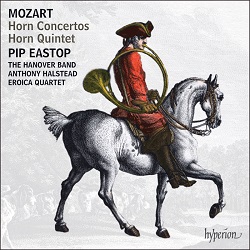
|
Wolfgang Amadeus MOZART (1756-1791)
Horn Concerto No.2 in E flat, K417 (1783) [14:59]
Horn Concerto No.4 in E flat, K495 (1786) [16:39]
Horn Concerto No.3 in E flat, K447 (1787) [15:17]
Horn Concerto No.1 in D, K412 (K386b) (1791) (completed Anthony Halstead)
[8:59]
Horn Quintet in E flat, K407 (K386c) (1782) [16:50]
Pip Eastop (natural horn)
The Hanover Band/Anthony Halstead
Eroica Quartet (Peter Hanson (violin); Vicci Wardman, Ian Rathbone (viola);
David Watkin (cello)
rec. St. John the Baptist, Loughton, Essex, England, 18 February 2011
(Quintet) and All Saints, East Finchley, London, 15-18 October 2013 (Concertos).
DDD
HYPERION CDA68097 [72:44]
Anthony Halstead has made two stylish recordings
of the Mozart Horn Concertos as soloist, with the Academy of Ancient
Music and Christopher Hogwood (Decca Rosette Collection 4767088, mid-price)
and with the Hanover Band and Roy Goodman (Nimbus NI5104). Now he steps
back from the solo spot to direct these performances. The Nimbus recording
offers the fragment K494a but the new Hyperion includes a more substantial
bonus in the form of the Horn Quintet, K407.
There are already enough recordings of these concertos to sink the
proverbial ship — over fifty at the current count — but
even if you have the classic Dennis Brain recordings with Herbert
von Karajan (Warner/EMI Masters 6783282, mid-price, with Quintet for
Piano and Wind), as surely almost all Mozarteans do, there's a place
for an alternative set on the natural horn and with the advantage
of modern recording.
Mozart deliberately made these concertos difficult to play on the
natural horn and even included rude remarks in the score about how
hard it would be for their dedicatee, Ignaz Leutgeb or Leitgeb, to
negotiate them. Despite the references to him as an ‘ass, ox
and simpleton’ Leutgeb seems to have been a first-class performer.
If, as has been suggested, the joke direction to the soloist at one
point to play adagio against the orchestra’s allegro
refers to his tendency to enter slightly behind the accompaniment
it didn’t prevent him from being in great demand. Nor was he
ever, as popular legend has it, a cheese-monger.
Whatever the truth of that suggestion, Pip Eastop never drags any
of his entries, though some of the tempi which he and Anthony Halstead
adopt are a little more measured than you may be used to. If you have
in the back of your mind Flanders and Swann’s rendition of the
French Horn song, the finale of K495 (track 6) you'll find the pace
noticeably a little less hectic than theirs, supposedly modelled on
the Brain/Karajan recording.
What you will find, however, is that Eastop and Halstead make it sound
just as much fun, not least in the cadenza, and that’s true of
the whole recording. Though this is, as far as I’m aware, Eastop's
first recording, it’s hardly surprising that Hyperion have made
this their top release for January 2015, even ahead of the fourth
volume of The Cardinall’s Musick’s recordings of Tallis,
excellent as that is.
The blurb describes the programme of this CD as containing all the
music that Mozart wrote with Leutgeb in mind. In the case of the Horn
Quintet, K407, that’s probable rather than certain according
to Grove but I’m pleased that it was included. The most recent
alternative recording featuring the natural horn and period instruments
received a warm welcome from Colin Clarke — review:
Simon Thompson was slightly less enthusiastic — review
— but most will think K407 preferable to the various fragments
included on that live Signum recording from Roger Montgomery and the
OAE directed by Margaret Faultless. If the Signum takes your fancy,
however, that's also available for downloading in mp3, 16- or 24-bit
lossless sound from Hyperion.
Süssmayr’s completion of K412 is rejected on the reasonable
grounds that he did not have access to the autograph score. A new
and credible completion by Anthony Halstead takes its place. The process
is explained in the booklet which is, as usual with Hyperion, a model
of its kind, including the refutation of the usual myth that Leutgeb
was a cheese-monger. That’s another musical anecdote refuted
along with the story about the rats putting the organ out of action
and necessitating the guitar accompaniment for Stille Nacht.
I listened to this recording as a 24-bit download with pdf booklet
from hyperion-records.co.uk,
in which form it sounds very well indeed. I also sampled the mp3 and
that, too, is very good of its kind, so the 16-bit CD which falls
between the two should also sound very well.
Dennis Brain’s recording will always form part of my Mozart listening
schedule and I shan’t throw out the super-budget-price Warner
Apex with David Pyatt, the Academy of St Martin-in-the-Fields and
Neville Marriner, which I thought the equal of anything available
(2564681619 — review)
but I very much enjoyed this new recording, too. Any good performance
of great music brings out aspects that one hadn’t heard before;
this recording made me hear more new aspects of the concertos and
especially of the quintet than any other. It’s emphatically not
just for the period-instrument brigade.
Brian Wilson
 |
 |
|











